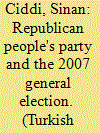| Srl | Item |
| 1 |
ID:
084208


|
|
|
|
|
| Publication |
2008.
|
| Summary/Abstract |
The founding party of modern Turkey continues to find it difficult to build electoral alliances and to appeal to an increasingly diversifying Turkish electorate. Although the party has maintained its electoral position in comparison to the 2002 general elections, the incumbent Justice and Development Party (AKP) has considerably increased its own vote share. While short term factors such as leadership can be cited for the electoral weakness of the Republican People's Party (CHP), this essay speculatively concludes that it is perhaps unrealistic to expect the party to revise its ultra-secularist and ultra-nationalist outlook based upon a combination of a weak track record of consolidating ideological change and the existence of political capital that remains to be gained from maintaining a rigid stance towards issues of public debate.
|
|
|
|
|
|
|
|
|
|
|
|
|
|
|
|
| 2 |
ID:
134771


|
|
|
| 3 |
ID:
134772


|
|
|
|
|
| Summary/Abstract |
This article seeks to account for the prolonged inability of the Republican People's Party (Cumhuriyet Halk Partisi, CHP) to be considered as a credible alternative to the governing Justice and Development Party (Adalet ve Kalkınma Partisi, AKP). Accounting for this is relevant from two perspectives: the emergence of a dominant party system during the AKP decade, and the increased rhetoric and public discourse stressing the “lack of [credible] opposition parties” in the party spectrum. The article attributes the CHP's electoral malaise to a mixture structural and leadership problems specific to the party organization. This argument, however, is placed against the backdrop of the dominant distributive position that the incumbent occupies in Turkey's political arena. The AKP's domination of both national and local government, typified by a service-oriented governing style, serves to undermine not just the CHP's chances of success, but virtually all opposition parties.
|
|
|
|
|
|
|
|
|
|
|
|
|
|
|
|